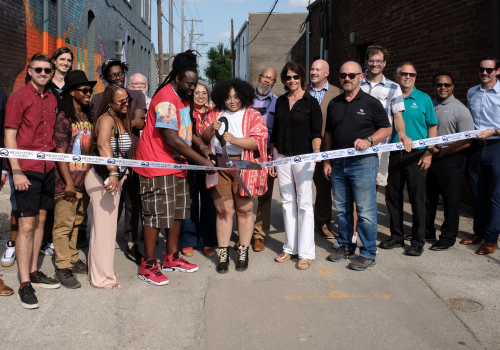Legislative Overview - January 2024
January 29, 2024

With the first month of the new year coming to a close, the Quad Cities Chamber has been busy at work in Des Moines, Springfield and Washington D.C.
In Iowa, things are off to a slower start with Area Education Agency (AEA) being the focus before other priorities move. Illinois gaveled in for two days to kick off session and bill submissions, with some of the Chamber’s priorities on the way to being drafted. In D.C., budgets and immigration continue to be a main point of contention but the Chamber remains focused on promoting pro-growth and pro-workforce development policies.
Federal
- Tax Legislation - Illinois Manufacturers’ Association Letter: The Quad Cities Chamber signed onto an Illinois Manufacturers’ Association coalition letter this month. Rep. Jason Smith (R-MO), Chairman of House Ways & Means Committee, and Sen. Ron Wyden (D-OR), Chairman of Senate Finance, announced bipartisan and bicameral legislation that will 1) restore immediate R&D expensing, 2) create a pro-growth interest deductibility standard and 3) allow full expensing for capital equipment purchases.
- Site-Readiness/ONSHORE Act: The Chamber supports the ONSHORE Act, introduced by Sens. Mark Kelly (D-AZ), JD Vance (R-OH) and Tom Cotton (R-AR). The bill would help provide funding to make sites ready for foreign direct investment projects and advanced manufacturing projects.
- JOBS Act of 2023: This legislation would expand Pell Grant eligibility to students seeking 8-week (or longer) skills and job training programs that lead to industry-recognized certificates and employment in high-wage, high-skill industry careers. This bill is co-sponsored by Tim Kaine (D-VA) and Mike Braun (R-IN). The Chamber continues to monitor this legislation.
- PELL Act: Introduced by Rep. Elise Stefanik (R-NY), this is considered the Republican response to the JOBS Act of 2023. The bill expands Pell Grants to students seeking programs for certificates to enter the workforce in high-wage, high-skill industries, but requires programs to cater more to in-demand industry sectors and for the Department of Education to determine that a program is eligible based on a “positive return on investment.” The Chamber is monitoring the PELL Act.
Iowa
- MEGA (Major Economic Growth Attraction) Program: This legislation would create an incentive program meant to assist the state in closing on major investments and business relocations. First introduced in 2023, the Chamber is working hard to see this through to make Iowa a more competitive destination for major investment. Tell our legislators you support this program in our Advocacy Action Center.
- Governor Reynold’s Tax Bill: The Chamber is supporting the Governor’s tax bill, which would accelerate the reduction of individual income taxes to 3.5%, simplify the unemployment insurance process and reduce costs for childcare centers. The Chamber will continue to monitor this legislation as the General Assembly makes changes to it.
- E-Verify: The Chamber opposes efforts to require E-Verify enrollment in Iowa which would lead to higher regulatory costs and impose barriers to employment for Iowans. E-Verify is a system that has a reputation for inaccuracies and can lead eligible workers to be denied work. Existing processes, such as the requirement to submit I-9 documentation, already ensure employers are hiring employees eligible to work in the United States. Take action to oppose a state mandate for E-Verify in our Advocacy Action Center.
Illinois
- Historic Tax Credit: Sen. Mike Halpin has introduced legislation to triple the allocation for the Historic Tax Credit in Illinois from $25 million to $75 million. This legislation is designed to help level the playing field and ensure that historic preservation projects can be funded on the Illinois side of the river. The Chamber looks forward to working with local and state partners to move this bill forward.
- Middle-Income Housing Credits: Sen. Halpin has also introduced this bill, which would provide a tax credit for developers in Illinois who build housing geared toward middle-income residents. This legislation is based on similar programs from Michigan, Minnesota and Iowa, and would incentivize the development of affordable housing for working families. The bill also contains provisions to ensure that the benefits of the program are not swallowed up by larger communities and that the Quad Cities gets a fair shot. The Chamber will monitor this bill as it proceeds through the State Legislature.
- Mega Projects: Illinois has introduced its own Mega Project program this session. The bill appears to provide for an assessment freeze on large projects that make improvements to a site if certain conditions are met. The Chamber is monitoring this bill and is in the evaluation process before we take a position.
- Other tracked items: The Chamber is tracking a plethora of employment law regulations being proposed by the Illinois legislature. We evaluate each proposal on a case-by-case basis, but we oppose anything that will make organizational management more difficult for Illinois employers.
- Illinois Brownfield Program: The Chamber has also proposed enhancements to the Illinois Brownfield program by including three new components: 1) Sales and Use Tax Exemption on building materials, 2) a tax credit of 10% up to $250,000 for brownfield redevelopment projects after a certificate of completion is obtained and 3) a new Grayfield component that would incentivize redevelopment of unused office or commercial space, with a 5% credit up to $250,000. Although there has not been a bill introduced yet, we understand it is in the drafting process and you will find it on our bill tracker as soon as we become aware of its release.





